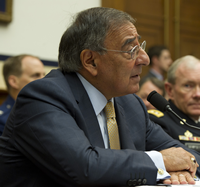If national security flows from economic strength, then the ongoing global economic crisis is poised to strike at one of the more underappreciated tools in the security kit -- the checkbook. We’re all familiar with the term “checkbook diplomacy.” But “checkbook security” has played a largely unsung role in America’s approach to national security over the past decade -- from "buying off" Sunni insurgents in Iraq as part of the Surge to funding development projects in Afghanistan as part of the war effort to helping countries in Latin America and Africa improve their capabilities to fight drug traffickers and organized crime.
In many unstable parts of the world, a tenuous peace holds because it is being bought. For instance, the Bosnian civil war -- the most destructive conflict in Europe since World War II -- has not reignited largely because a cumbersome governing structure was put in place that includes unnecessary duplication of offices and functions to guarantee that the interests of Bosnia's three main communities -- Croats, Muslims and Serbs -- are represented. On its own, Bosnia would be unable to maintain this unwieldy apparatus, which has been sustained by the transfer of billions of dollars over the past 15 years, primarily from the countries of the European Union.
Security can also be purchased. Part of the U.S.-NATO strategy for Afghanistan is to stand up an extensive and modern Afghan military and police force far beyond the ability of Afghanistan's own underdeveloped economy to maintain on its own. Kabul’s inability to pay for these structures once the West withdraws explains the recent panicked appeals from the government of Afghan President Hamid Karzai not to be "abandoned" -- an appeal rooted in recent historical experiences. After all, the Najibullah government fell in 1992 after a post-Soviet Russia, gripped in the midst of its own devastating economic crisis, could no longer provide the generous amounts of aid needed to prop it up.

